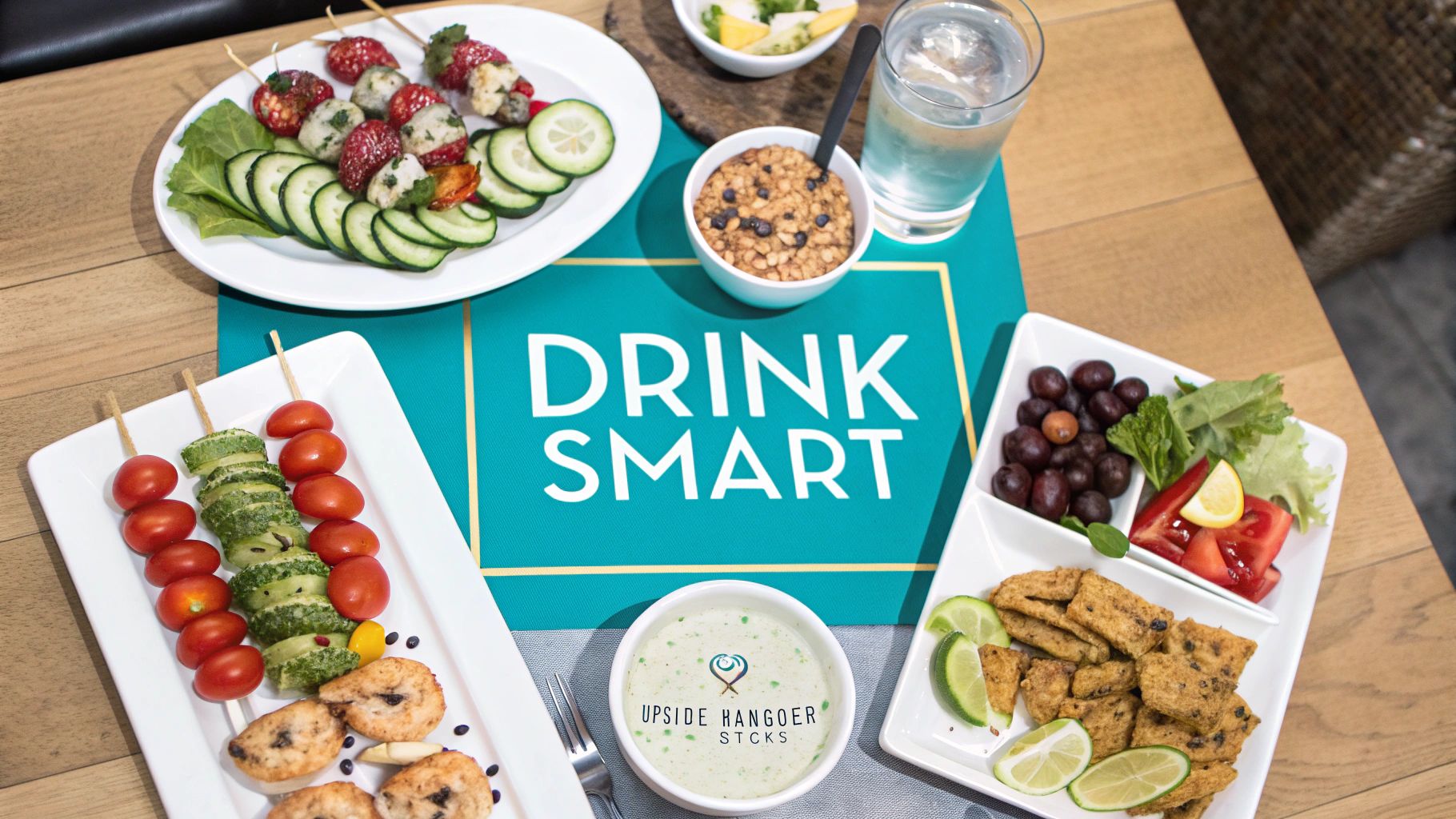

· By Annemarie
7 Best Foods to Eat While Drinking in 2025
Drink Smarter, Not Harder: Your Proactive Eating Plan
A great night out doesn't have to mean a rough morning after. The secret isn't just about what you drink, but what you eat while you drink. Strategic eating can transform your experience by managing alcohol absorption, protecting your liver, and keeping your energy stable. Forget the greasy, post-bar junk food; we're diving into the science-backed best foods to eat while drinking.
This isn't about restriction; it's about empowerment. By pairing your favorite beverages with the right nutrients, you can support your body's natural processes, minimize negative effects, and wake up feeling refreshed. This guide will walk you through seven powerhouse foods, explaining exactly why they work and how to seamlessly integrate them into any social occasion. To give your body an even greater edge, consider pairing these foods with a proactive solution like Upside Hangover Sticks. This convenient jelly is designed with traditional Korean-inspired ingredients to help you live more and enjoy your night, worry-free. Let's explore the foods that will make your next celebration a healthier, happier one.
1. Eggs (Cooked)
When considering the best foods to eat while drinking, the humble egg often tops the list, and for good reason. Far more than a simple breakfast staple, cooked eggs are a nutritional powerhouse perfectly suited to prepare your body for alcohol consumption. Their effectiveness lies in a dense combination of high-quality protein and healthy fats, which work together to slow the emptying of your stomach. This process effectively reduces the rate at which alcohol is absorbed into your bloodstream, giving your body more time to process it and mitigating sharp spikes in blood alcohol concentration.
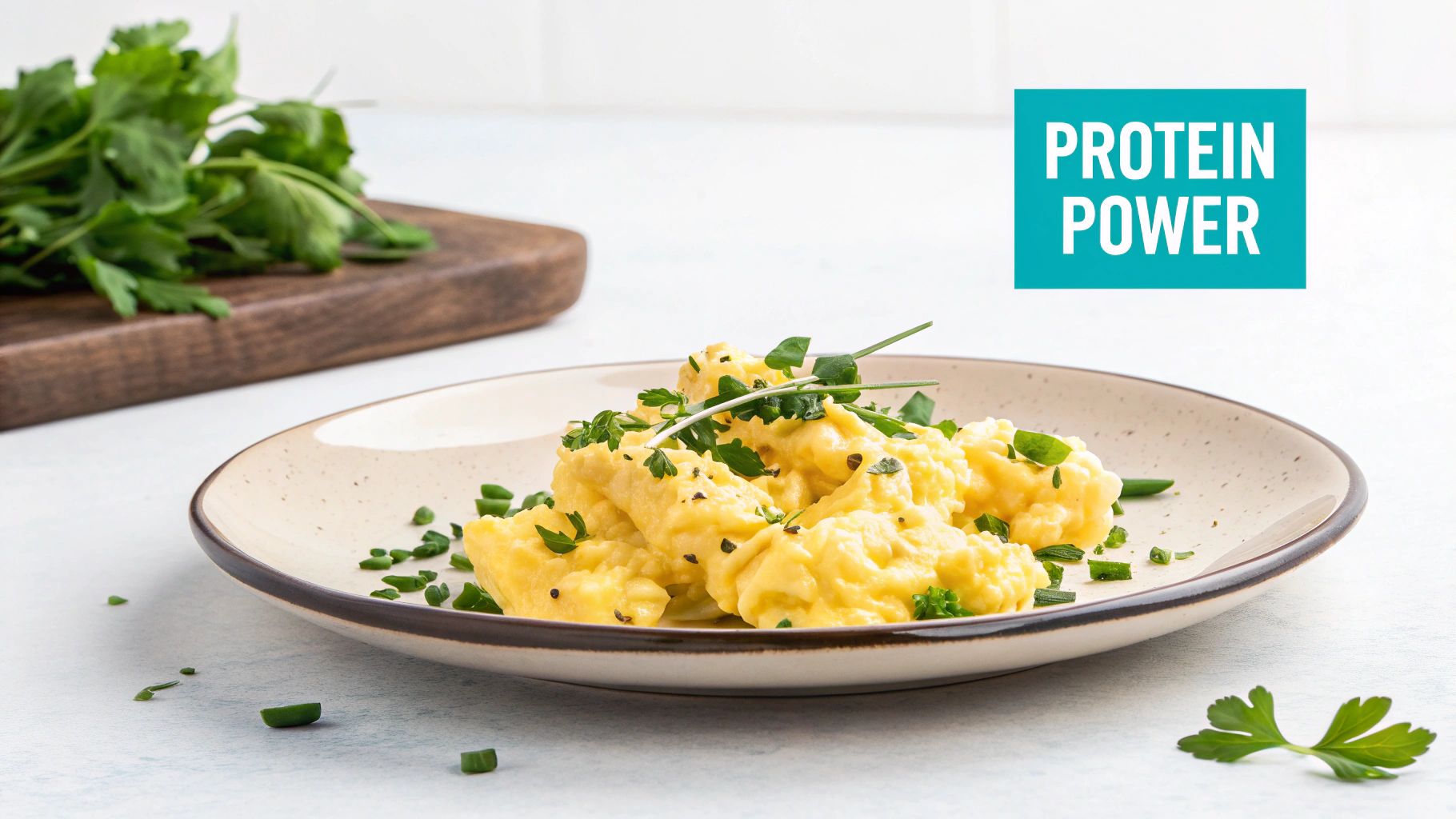
Beyond simply slowing absorption, eggs provide crucial support for your liver. They are rich in an amino acid called cysteine, which plays a vital role in breaking down acetaldehyde. Acetaldehyde is a toxic compound produced when your liver metabolizes alcohol, and it's a major contributor to the unpleasant symptoms associated with hangovers. By helping your body metabolize this toxin more efficiently, eggs can help lessen the next day's negative effects.
How to Implement Eggs in Your Drinking Routine
Integrating eggs is practical across various social settings. You can find them prepared in ways that fit almost any occasion where alcohol is served.
- Brunch Bars: Opt for scrambled eggs or an omelet alongside your mimosa or bloody mary.
- Cocktail Parties: Deviled eggs are a classic, sophisticated, and effective party snack.
- Sports Bars & Pubs: An egg sandwich or a traditional British Scotch egg provides a substantial, protein-rich base.
For a deeper dive into how your body processes alcohol and why these food choices matter, this video offers a helpful visual explanation.
Actionable Tips for Maximum Benefit
To get the most out of this strategy, timing and preparation are key.
- Eat Before or During: Consume eggs before you start drinking or as a snack during your first couple of drinks. Eating them afterward is less effective for slowing absorption.
- Pair with Complex Carbs: Combine eggs with whole-wheat toast or potatoes to further slow digestion and stabilize blood sugar.
- Choose Cooked Preparations: Stick to cooked forms like scrambled, boiled, or poached. Raw preparations like those in some cocktails (e.g., a classic whiskey sour with egg white) do not offer the same digestive-slowing benefits and carry a risk of salmonella. Simple preparations are also easiest on your digestive system.
2. Bananas
Often praised by sports nutritionists for their restorative properties, bananas are one of the best foods to eat while drinking due to their exceptional potassium content. Alcohol is a diuretic, meaning it makes you urinate more frequently, which flushes out key electrolytes like potassium. This depletion can lead to symptoms like fatigue, weakness, and muscle cramps. Consuming a banana helps proactively replenish these crucial potassium stores, counteracting alcohol's dehydrating effects and supporting proper nerve and muscle function.
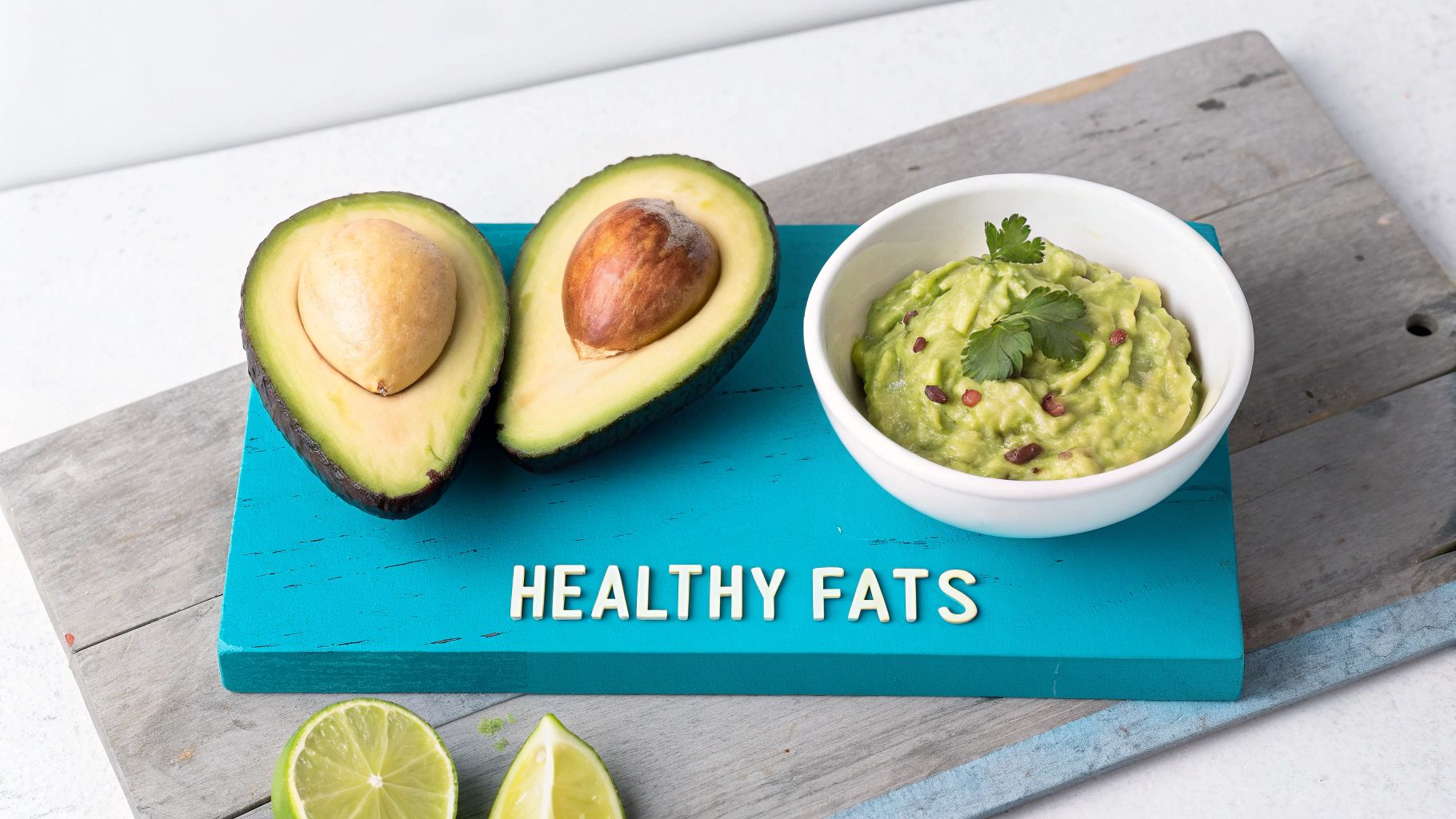
Beyond electrolyte balance, bananas provide a source of natural sugars and fiber. This combination supplies quick energy while also being gentle on the stomach, which can be sensitive during alcohol consumption. The fruit's soft texture and easy digestibility make it an ideal, non-irritating choice to have before or during a night out, preventing the discomfort that heavier, greasier foods might cause.
How to Implement Bananas in Your Drinking Routine
Bananas are incredibly versatile and can be incorporated into your drinking plans in both casual and creative ways, a practice often seen in tropical destinations and health-focused establishments.
- Beach Bars & Resorts: You'll often find frozen bananas blended into alcoholic smoothies or used as a garnish for daiquiris and piña coladas.
- Casual Gatherings: Sliced bananas served with a side of peanut or almond butter make for a simple, effective, and protein-packed snack.
- Bar Snacks: Some health-conscious bars offer banana chips as a crunchy, potassium-rich alternative to salty nuts or pretzels.
To better understand how electrolyte replenishment is key to feeling good, you can explore the science behind rehydration after drinking.
Actionable Tips for Maximum Benefit
To get the most out of this simple fruit, a little planning goes a long way.
- Eat Before and After: Have one banana before you start drinking to build up potassium levels, and keep another one handy for the next morning to aid recovery. A good rule of thumb is one banana for every 2-3 drinks.
- Pair with Protein: Combining a banana with a protein source like yogurt or peanut butter helps to further slow alcohol absorption and provides more sustained energy.
- Choose Wisely: Opt for bananas that are still slightly green at the tips. They have a higher content of prebiotic fiber and a lower sugar concentration, which helps stabilize blood sugar levels more effectively.
3. Avocado
Avocado has earned its reputation as a superfood, and its benefits extend impressively to social drinking occasions. This creamy fruit is an excellent choice for one of the best foods to eat while drinking, primarily due to its high concentration of healthy monounsaturated fats. Similar to protein, these fats significantly slow down stomach emptying. This delay means that alcohol is absorbed into your system much more gradually, preventing the rapid increase in blood alcohol content that can intensify intoxication and lead to a more severe hangover.
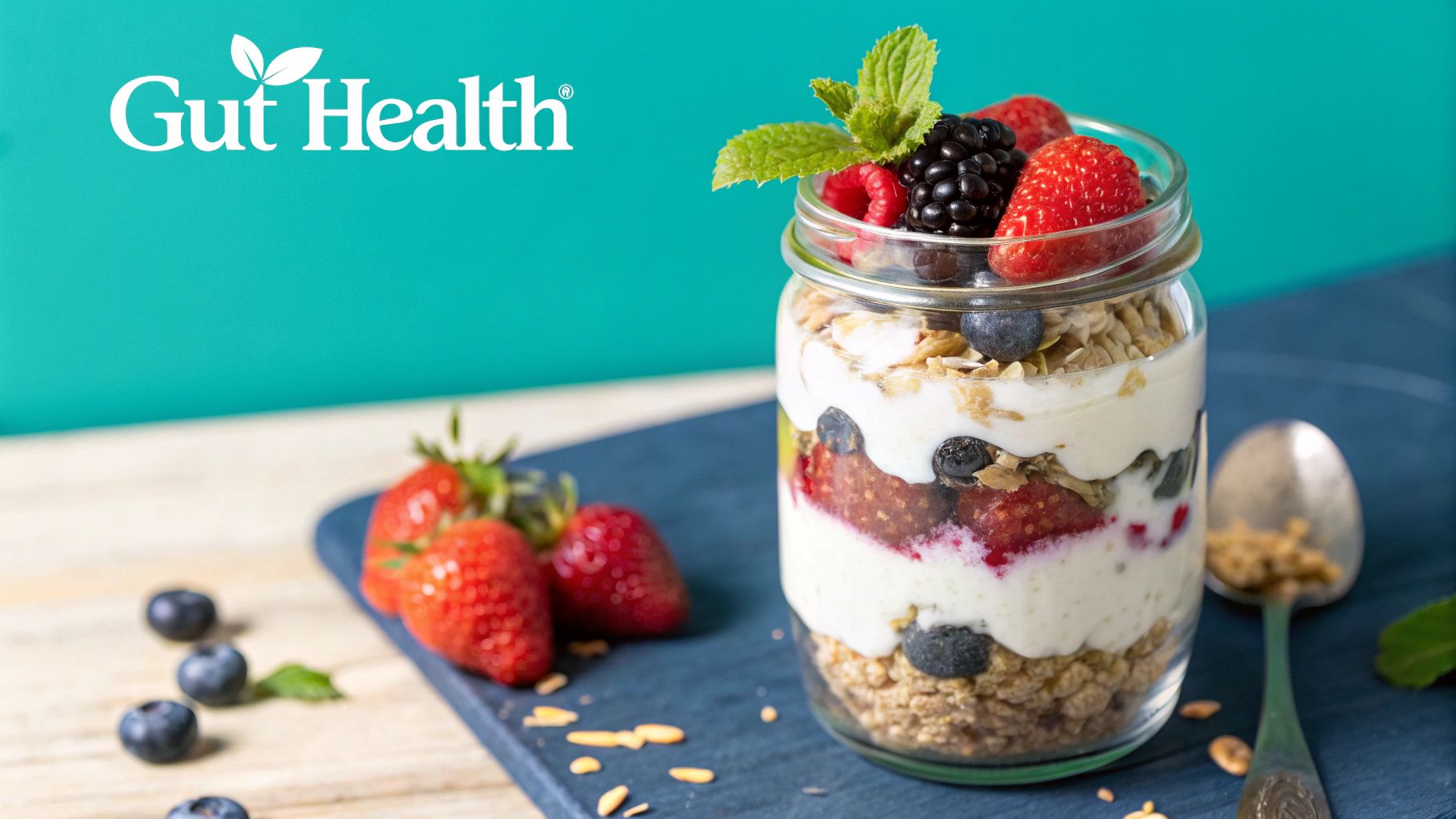
Beyond its healthy fats, the avocado is exceptionally rich in potassium, a critical electrolyte often depleted by alcohol's diuretic effects. Maintaining electrolyte balance is key to staying hydrated and avoiding symptoms like fatigue and headaches. Furthermore, avocados contain compounds that may help protect the liver from damage. By preparing your body with these nutrients, you are actively mitigating some of the primary factors that contribute to hangovers. To better understand the science behind this, you can learn more about what causes hangovers and how your body reacts to alcohol.
How to Implement Avocado in Your Drinking Routine
Thanks to its versatility, avocado is easy to incorporate into meals and snacks before or during a night out. It's a common feature in many cuisines served in social settings.
- Bars & Restaurants: Guacamole is a classic, shareable appetizer that pairs perfectly with margaritas or beer.
- Gastropubs: Look for burgers or chicken sandwiches topped with sliced avocado for a substantial, well-rounded meal.
- Brunch Spots: Avocado toast is a popular and effective option to have alongside a brunch cocktail.
Actionable Tips for Maximum Benefit
Timing and preparation can enhance the protective effects of eating avocado with your drinks.
- Eat Before You Go: Consuming half an avocado before you even start drinking can provide a protective, slow-digesting base in your stomach.
- Pair with Complex Carbs: Combining avocado with whole-grain crackers or toast adds fiber, further slowing alcohol absorption and helping to stabilize your blood sugar levels.
- Keep it Fresh: If preparing it at home, add a squeeze of lime or lemon juice to your avocado to prevent it from browning.
- Choose Ripe but Firm: A perfectly ripe avocado is easy to mash for guacamole or slice for a sandwich. It should yield to gentle pressure but not feel mushy.
4. Greek Yogurt
Greek yogurt stands out as one of the best foods to eat while drinking, thanks to its unique combination of protein, healthy fats, and probiotics. Much like eggs, its primary benefit comes from its high protein content, which significantly slows down stomach emptying. This delay in gastric emptying means that alcohol enters your bloodstream more gradually, preventing a rapid spike in blood alcohol concentration and giving your liver more time to metabolize it effectively. The thick, creamy texture makes it a satisfying and substantial pre-drinking snack.
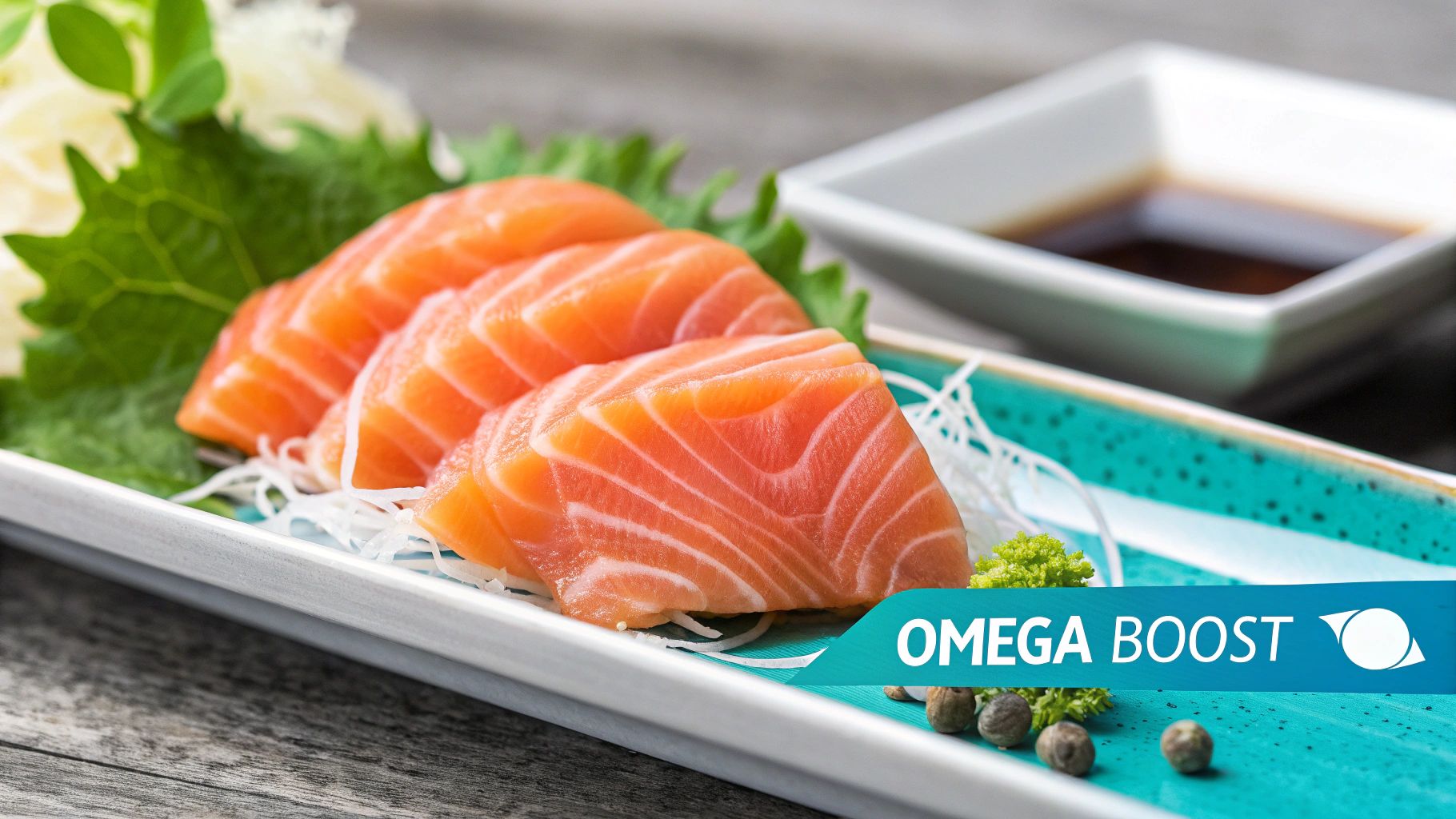
Beyond its protein power, Greek yogurt is a champion for gut health. Alcohol can disrupt the delicate balance of bacteria in your digestive system, but the live and active cultures, or probiotics, in Greek yogurt help support a healthy gut microbiome. It also contains a good amount of B vitamins, particularly B12, which are often depleted during alcohol consumption and are crucial for energy metabolism and brain function. Replenishing these nutrients beforehand can help mitigate some of alcohol's draining effects.
How to Implement Greek Yogurt in Your Drinking Routine
Popularized by both Mediterranean cuisine and the modern wellness industry, Greek yogurt is incredibly versatile and easy to incorporate before a night out.
- Mediterranean Restaurants: Enjoy a side of tzatziki sauce with your gyro or kebabs. This classic dip is made from a Greek yogurt base.
- Brunch & Cafes: A Greek yogurt parfait layered with fruit and granola is an excellent choice to have with a morning or afternoon cocktail.
- At Home: A simple bowl of Greek yogurt topped with berries and nuts before heading out is a quick and effective option. You can also use it as a base for healthier salad dressings or dips for vegetable sticks.
Actionable Tips for Maximum Benefit
To leverage the full potential of Greek yogurt, consider how and when you eat it.
- Choose Plain, Unsweetened Varieties: Opt for plain Greek yogurt to avoid added sugars, which can exacerbate inflammation and lead to a worse hangover.
- Add Fresh Fruit: If you need sweetness, add fresh fruits like berries or bananas. They provide natural sugars, fiber, and additional vitamins and electrolytes.
- Consume 30-60 Minutes Before Drinking: Eating a bowl of Greek yogurt about an hour before your first drink gives your digestive system a head start in slowing down absorption.
- Use as a Dip Base: Swap out sour cream or mayonnaise for Greek yogurt when making dips for a party. It’s a healthier, protein-rich alternative that still delivers on flavor and texture.
5. Quinoa
When searching for the best foods to eat while drinking, the ancient grain quinoa emerges as a modern, health-conscious champion. This versatile seed is a nutritional heavyweight, offering a rare combination of being a complete protein and a complex carbohydrate. This dual-action profile is ideal for drinking occasions, as it provides sustained energy release and helps stabilize blood sugar levels, preventing the energy crashes often associated with alcohol consumption. Its high fiber content also plays a critical role in slowing down gastric emptying, which in turn moderates the speed at which alcohol enters your system.
Quinoa's benefits extend well beyond just slowing alcohol absorption. It is packed with essential nutrients that can be depleted by drinking, such as magnesium and various B vitamins. Magnesium is crucial for hundreds of biochemical reactions in the body, including electrolyte balance, while B vitamins are vital for energy metabolism. By fortifying your body with these nutrients before or during drinking, you are proactively supporting your system's ability to process alcohol and recover more efficiently, potentially reducing the severity of next-day fatigue.
How to Implement Quinoa in Your Drinking Routine
Popularized by the health food movement and gluten-free dietary needs, quinoa is now a common feature on menus in diverse settings, making it easy to incorporate.
- Wine Bars & Bistros: Look for quinoa salads, often paired with roasted vegetables, feta, and a light vinaigrette.
- Health-Focused Restaurants: Quinoa bowls are a staple, typically served with a choice of protein like chicken or chickpeas, making for a substantial meal.
- Mediterranean or Middle Eastern Venues: Enjoy quinoa as a base in tabbouleh or as a filling in stuffed peppers or grape leaves.
For a deeper understanding of how macronutrients like those in quinoa affect alcohol metabolism, this video from a registered dietitian provides excellent insights.
Actionable Tips for Maximum Benefit
To make quinoa a practical part of your routine, a little preparation goes a long way.
- Rinse Thoroughly: Quinoa has a natural coating called saponin that can taste bitter. Always rinse it under cold water before cooking to remove this residue.
- Prepare in Advance: Cook a large batch of quinoa at the start of the week. It stores well in the refrigerator and can be quickly added to meals before you go out.
- Mix with Vegetables: Combine cooked quinoa with chopped cucumbers, tomatoes, and bell peppers for a hydrating, nutrient-dense meal that provides fiber and electrolytes.
- Season Generously: Quinoa has a naturally mild, nutty flavor that benefits greatly from herbs, spices, or a flavorful dressing. Don't be afraid to season it well.
6. Sweet Potatoes
When curating a list of the best foods to eat while drinking, sweet potatoes emerge as a stellar choice, championed by the health food movement and Southern American cuisine alike. These vibrant tubers are loaded with complex carbohydrates and fiber, which are critical for slowing down digestion. This gradual digestion process helps to stabilize your blood sugar levels and, more importantly, moderates the rate at which alcohol enters your system, preventing the rapid intoxication that can occur on an empty stomach.
Beyond their carbohydrate content, sweet potatoes are exceptionally rich in potassium, a crucial electrolyte that alcohol consumption can deplete. Maintaining electrolyte balance is key to staying hydrated and avoiding common next-day issues like headaches and fatigue. They also provide a significant amount of Vitamin A and antioxidants, which support overall health and liver function, providing your body with essential nutrients to better handle the metabolic stress of processing alcohol.
How to Implement Sweet Potatoes in Your Drinking Routine
Sweet potatoes are versatile and have become a common fixture on menus, making them easy to incorporate into your plans for a night out.
- Gastropubs & Bars: Swap regular french fries for sweet potato fries, a widely available and satisfying option.
- Restaurants: Look for roasted sweet potato wedges or mashed sweet potatoes as a side dish to accompany your main course.
- Casual Gatherings: Baked sweet potato chips serve as a fantastic and much healthier alternative to standard potato chips.
For more insights into how different foods affect alcohol metabolism and practical tips for healthier drinking habits, this resource offers valuable information.
Actionable Tips for Maximum Benefit
To fully leverage the benefits of sweet potatoes, consider how and when you eat them.
- Eat the Skin: The skin of a sweet potato is packed with fiber, which is essential for slowing alcohol absorption. Opt for preparations where the skin is left on.
- Roast or Bake: Choose roasted or baked versions over fried ones. This method preserves more nutrients and avoids the extra unhealthy fats that can burden your digestive system.
- Pair with Protein: Combine sweet potatoes with a protein source like grilled chicken or black beans to create a more balanced meal that further slows digestion and provides sustained energy.
- Prepare in Advance: If you're pre-gaming at home, bake some sweet potato wedges ahead of time. They are easy to reheat and make for a perfect pre-drinking meal.
7. Salmon and Fatty Fish
When seeking sophisticated and effective food choices for a night out, salmon and other fatty fish stand out as one of the best foods to eat while drinking. Their inclusion in this list is due to a powerful combination of high-quality protein and, most notably, omega-3 fatty acids. This nutrient pairing works to slow stomach emptying, which in turn moderates the speed at which alcohol enters your system. This helps prevent sudden intoxication and gives your liver more time to metabolize the alcohol effectively.
Beyond absorption, the high concentration of omega-3 fatty acids in fish like salmon offers significant anti-inflammatory benefits. Alcohol consumption can induce inflammation throughout the body, a key factor in feeling unwell during and after drinking. By consuming these healthy fats, you can help counteract this inflammatory response. Furthermore, the protein content helps maintain stable blood sugar levels, preventing the energy crashes that can sometimes accompany drinking on an empty stomach.
How to Implement Salmon in Your Drinking Routine
Fatty fish are versatile and can be found on menus in many social settings, from casual get-togethers to upscale dinners.
- Japanese Restaurants: Enjoying sashimi or sushi rolls with salmon or tuna is a perfect way to prepare for a round of sake or cocktails.
- Wine Bars & Upscale Lounges: Smoked salmon on blinis or as part of a charcuterie board is a classic, elegant pairing.
- Fine Dining: A main course of grilled or pan-seared salmon provides a substantial, nutrient-dense meal before a long evening.
- Cocktail Parties: Salmon tartare or smoked salmon bites make for excellent, easy-to-eat appetizers that deliver key nutrients.
The benefits of these foods extend beyond just pre-drinking preparation. To discover more about beneficial post-drinking meals, you can explore what to eat after a night of drinking with these 8 hangover helpers from enjoyupside.com.
Actionable Tips for Maximum Benefit
Timing and sourcing can enhance the positive effects of consuming fatty fish alongside alcohol.
- Eat Before or Early: Consume your salmon dish before you begin drinking heavily or during your first drink to maximize the digestive-slowing benefits.
- Pair with Complex Carbs: Serve salmon with quinoa, brown rice, or roasted sweet potatoes to add fiber and further stabilize your energy levels.
- Prioritize Wild-Caught: When possible, choose wild-caught salmon, as it typically has a higher concentration of omega-3 fatty acids compared to its farmed counterpart.
- Ensure Proper Cooking: If eating cooked fish, make sure it's prepared properly. Overcooking can diminish its nutritional value, while undercooking carries health risks.
Nutritional Benefits Comparison of Top 7 Drink-Friendly Foods
| Item | Implementation Complexity 🔄 | Resource Requirements ⚡ | Expected Outcomes 📊 | Ideal Use Cases 💡 | Key Advantages ⭐ |
|---|---|---|---|---|---|
| Eggs (Cooked) | Low – Quick cooking needed | Low – Affordable, widely available | Slows alcohol absorption, supports liver detox | Before or during drinking, quick energy source | High protein, cysteine aids alcohol metabolism |
| Bananas | Very low – Ready to eat | Very low – Portable, natural fruit | Maintains electrolyte balance, quick energy | During drinking, prevents cramps, morning recovery | High potassium, easy digestion |
| Avocado | Medium – Requires preparation | Medium – Can be costly and seasonal | Significantly slows absorption, stable blood sugar | Before drinking, sustained energy | Healthy fats, potassium, anti-inflammatory |
| Greek Yogurt | Low – Ready to serve | Medium – May be pricier than regular yogurt | Slows absorption, supports digestion and B vitamin replenishment | Before drinking, digestive support | High protein, probiotics, sustained energy |
| Quinoa | Medium – Requires cooking | Medium – Can be expensive | Stabilizes blood sugar, sustained energy | Health-focused meals before drinking | Complete protein, high fiber, gluten-free |
| Sweet Potatoes | Medium – Needs cooking time | Low to medium – Seasonal | Stabilizes blood sugar, supports liver | Side dishes for sustained energy | Rich in complex carbs, antioxidants |
| Salmon and Fatty Fish | Medium – Proper cooking required | Medium to high – Costly, fresh fish | Slows absorption, supports liver, anti-inflammatory | Before heavy drinking, fine dining or health focus | Omega-3 rich, high quality protein |
The Ultimate Toolkit for a Better Morning
Balancing a vibrant social life with your personal well-being doesn't require compromise, it requires strategy. Throughout this guide, we've moved beyond generic advice and explored a specific, science-backed toolkit of foods that can fundamentally change your drinking experience. By understanding why certain foods are beneficial, you can make smarter, more effective choices that support your body when it needs it most. The days of simply hoping for the best the morning after are over; you now have a proactive plan.
The core principle is simple: fortify your system before, during, and after you drink. The best foods to eat while drinking are those that arm your body with essential nutrients to counteract alcohol's effects. This isn't about restriction. It's about strategic addition. It’s about choosing the salmon appetizer, adding avocado to your meal, or preparing a quinoa bowl before heading out for the evening.
Key Takeaways for Smarter Socializing
Let’s distill this down to the most critical, actionable insights you can implement immediately:
- Prioritize Protein and Healthy Fats: Foods like cooked eggs, salmon, and avocado are your first line of defense. They slow the absorption of alcohol into your bloodstream, giving your liver more time to process it efficiently. This simple step can significantly reduce the intensity of alcohol's immediate impact.
- Replenish Electrolytes Continuously: Alcohol is a diuretic, meaning it flushes essential electrolytes like potassium and magnesium from your system. Bananas, sweet potatoes, and Greek yogurt are electrolyte powerhouses that help maintain your body's crucial fluid balance, preventing the dehydration that leads to headaches and fatigue.
- Timing is Everything: The most effective approach is proactive, not reactive. Eating a balanced meal that includes several of these superfoods before your first drink sets a solid foundation for the entire occasion. Snacking on them throughout the event, like enjoying Greek yogurt dip or guacamole, helps sustain those benefits.
Your Action Plan for the Next Occasion
Mastering this approach is about building new habits. Instead of defaulting to greasy, nutrient-poor options that can exacerbate inflammation and digestive distress, you can consciously build a better experience. Think of it as creating a personal "drinking day" meal plan. Maybe it’s an omelet with avocado for a pre-event brunch or a salmon and quinoa dinner. This small shift in planning elevates your night from a potential liability to a well-managed celebration.
By integrating these seven foods into your routine, you are doing more than just eating; you are investing in your tomorrow. You are ensuring that you can enjoy social connections and celebratory moments without sacrificing your productivity, energy, or overall health the next day. This toolkit empowers you to take control, enjoy yourself fully, and wake up feeling refreshed and ready to conquer your goals.
Ready to elevate your wellness toolkit even further? Pair these intelligent food choices with the targeted support of Upside. Our Hangover Sticks are scientifically formulated to replenish lost nutrients and support your liver, complementing the benefits of the best foods to eat while drinking. Try Upside Hangover Sticks today and discover your new essential for a great night out and an even better morning after.
